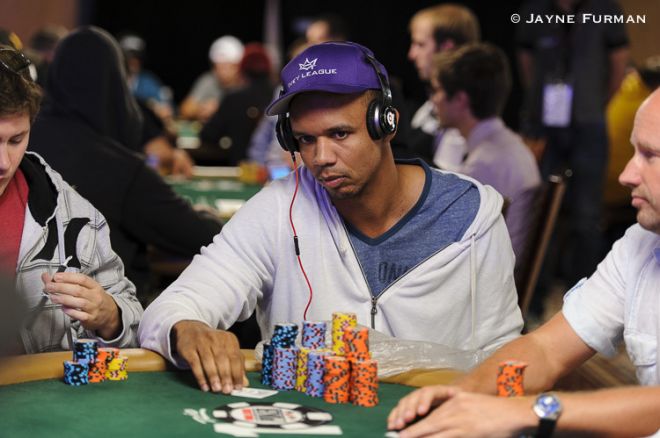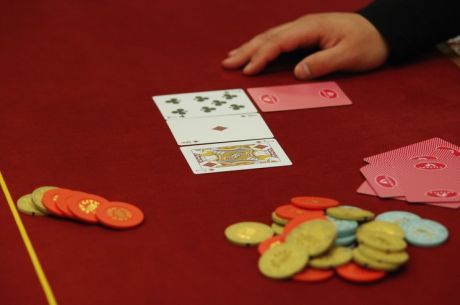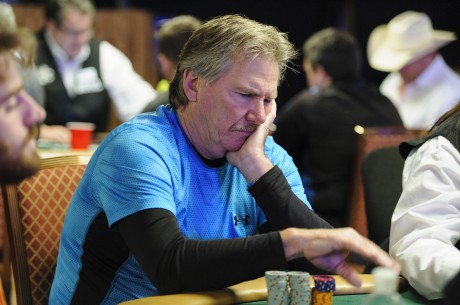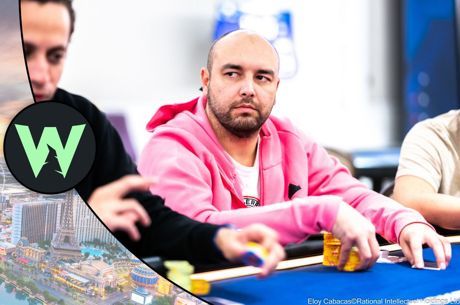Phil Ivey at the Feature Table: Two Hands from the 2014 WSOP Main Event, Day 4

ESPN is now well into airing its coverage from this summer’s World Series of Poker Main Event. During its presentation of Day 4, the network chose to highlight the popular Phil Ivey at their feature table.
A number of interesting hands involving Ivey were shown during the coverage. Let’s take a look back at a couple of them for some further analysis of both Ivey’s play and that of his opponents.
Hand #1: Gaudio Goes For It, Ivey Is There
The blinds were 2,000/4,000 with a 500 ante. Jason Riesenberg opened the action to 9,000 from middle position with K♣Q♣ — a standard play in this spot and reasonable. Jim Duncan then called from the cutoff with A♣6♣, also a reasonable decision given his position with the suited ace.
Next Robert Gaudio joined in by calling from the button with A♥Q♥. Given his position, a reraise would probably have been the optimal play because it would have accomplished two things: (1) driving out players in the blinds with unfavorable pot odds; and (2) forcing Riesenberg and Duncan to tough decisions knowing that they would have to be out of position after the flop.
Ivey was sitting in the small blind with more than 500,000 to start the hand, and from there he looked down to see 10♠10♥. Rather than call along as well, Ivey decided to reraise to 34,000. While there is an argument to try and keep the pot small when out of position, the raise is the more preferred play here as Ivey certainly didn’t want to be going up against three other players with his hand. Three-betting also gave Ivey an opportunity to win the hand right there.
Ivey’s reraise induced folds from both Riesenberg and Duncan — both good folds — and with the action back on Gaudio he moved all in for 127,000.
This shove was definitely an ill-advised play, especially considering the fact that the money bubble was close to bursting. First, Ivey’s big stack meant calling Gaudio’s push would mean risking only a little over 20% of his chips. Second, there was already nearly 200,000 in the pot, giving Ivey better than 2-to-1 on his money to make the call. In other words, Gaudio only really had fold equity if Ivey was squeezing.
The better play, especially considering that Gaudio had position, would have been to call, see what the flop brought, then watched how Ivey responded, thereby using his position to his advantage. Likely, Ivey would have led out on the 6♠4♠3♠ flop and Gaudio could have saved his last 93,000 for a better spot — and probably worked his way into the money by doing so. Instead he was eliminated when he lost the race to Ivey.
Hand #2: Ivey Powers, Sanchez Cowers
A little later the blinds had increased to 2,500/5,000 with a 500 ante when Ivey opened from under the gun to 11,000 with 7♦6♦. This was a bit loose of an opener, but given Ivey’s big chip advantage and recent dominance over the table, it was in line with his playing a wide range of hands while keeping his opponents off-balance.
It folded around to Marty Verdegaal who called with 8♣7♣ on the button. You’d like to see more people in the pot with a speculative hand like this in a raised pot, but having the button mades Verdegaal’s call not completely out of line. Nacho Sanchez then called the additional 6,000 out of the big blind with K♣10♥ — a tough hand to play out of position, especially against the likes of Ivey, but the price was right to call.
The flop came K♥Q♦J♦ and Sanchez checked. Checking here is fine, especially with Ivey to your left, as he is most often going to bet, and indeed Ivey did just that, putting out 20,000 in chips with his flopped flush draw. Verdegaal then folded and Sanchez called.
I’d prefer to see Sanchez check-raise here as it would take control away from Ivey and help define more precisely where Ivey was in the hand. If you’re going to play a hand like K♣10♥ with only 30 big blinds behind (as was the case for Sanchez), you’re not going to get a much better flop than this and need to be willing to go with it if you’re going to proceed any further.
The 5♣ on the turn changed nothing. Sanchez checked, and Ivey — taking advantage of his big stack and Sanchez’s apparent fear of busting out — bet 48,000. Sanchez called.
The river brought the 7♠, and Sanchez checked so quickly it was clear he was just hoping Ivey would not bet. Ivey, of course, failed to oblige, and put out enough chips to set Sanchez all in. As expected, Sanchez released his hand, and having used the power of his position and his chips, Ivey collected the pot.
Get all the latest PokerNews updates on your social media outlets. Follow us on Twitter and find us on both Facebook and Google+!








